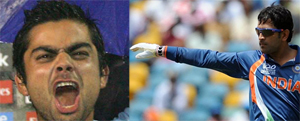
Virat Kohli's on-field aggression has been the topic of discussion in the cricket fraternity but the India vice-captain is working hard on changing his attitude with words of wisdom from his skipper Mahendra Singh Dhoni.
"I have been speaking to MS (Dhoni) a lot about it. He is one who doesn't sink or go above that line. He is someone who is always around that calm line. It is important to learn such things from such important people.
"He keeps telling me that once I stay around that line I would keep improving as a cricketer. Once that graph goes too much above or drops you end up putting yourself under pressure," Kohli said on Sunday.
Asked whether vice-captaincy has made him more conscious, he stated, "When I became vice-captain, people around me told me that I need to change my aggression. Because people are watching me more and I need to change my aggressive attitude.
"You learn with time. Initially, I reacted in a way I shouldn't have. When I look back now...it was not natural. The build-up and the pressure or the special occasions make it tough to control the aggression."
Call him a senior batsman in the team, and the 23-year-old retorts, "Please, I am not a senior batsman in this team. Good performances in a mere couple of seasons don't make anyone a senior batsman. A person becomes senior batsman when he has performed consistently for six or seven years."
By his own admission, Virat had put a lot of pressure on himself prior to the IPL after a great international season.
"To be honest, I was feeling the pressure more during the first half of IPL. I thought that I have set certain standards and I have to live up to it. It shifted me away from game plan. Latter half (of IPL), I was back on track.
"I am happy that it happened soon, I was able to realise that and able to learn from it. It is important you need to know your mindset and how to meet the expectations regardless of whether you are in or out of the team."
Asked if he is under extra pressure with Rahul Dravid's retirement opening the door for another youngster among the likes of Cheteshwar Pujara, Rohit Sharma or Ajinkya Rahane in the Test XI, Kohli said, "It's impossible to match consistency of someone like Rahul bhai. But I thrive in pressure situations. If there isn't pressure, there is isn't any fun."
"I like challenges. You look to improve in areas that you wouldn't have thought before. I don't pay attention to comparisons. Six or seven of us are there who will all be playing for India for a long time. Among the lot I will leave Rohit out as he is way talented among the lot. I know we will all be colleagues in the Indian team in near future."
Kohli felt that 10 Tests at home will give the new-look middle-order time to settle down before they play overseas.
"It's a good thing that we will play at home. Remember England and Australia beat us in their backyard. I can site my example. Before Tests in Australia, I had played against West Indies and got a few runs, it boosted my confidence."
And what was it that he did differently in Australia, Kohli replied with a wry smile, "I stopped reading the newspapers. In the first two matches, I was getting influenced by what all was being written and said about me. Criticism is natural when you are not doing well.
"I just blocked that out of my system. I started believing in myself. I kept telling myself that I had 8 ODI hundreds and that can't be fluke. I am good enough to do well at this level. I was in a zone and I played in a manner I wanted to. I didn't try and copy someone else."
According to Kohli, Peter Siddle and Ben Hilfenhaus are the two best pacers he has played against, with Sunil Narine and Saeed Ajmal being the two most difficult spinners to face.
Since there isn't any chance to play the longer version of the game before the New Zealand Test series, Kohli said that he is going to increase his batting time at the nets.
"We will have some practice games. Even if we don't have, I am sure to increase the hours I put in at the nets. I will be batting for at least three hours. Each individual has his own way of preparing. I will again be starting from zero and would like to improve as a batsman," he concluded.





Comments
Add new comment